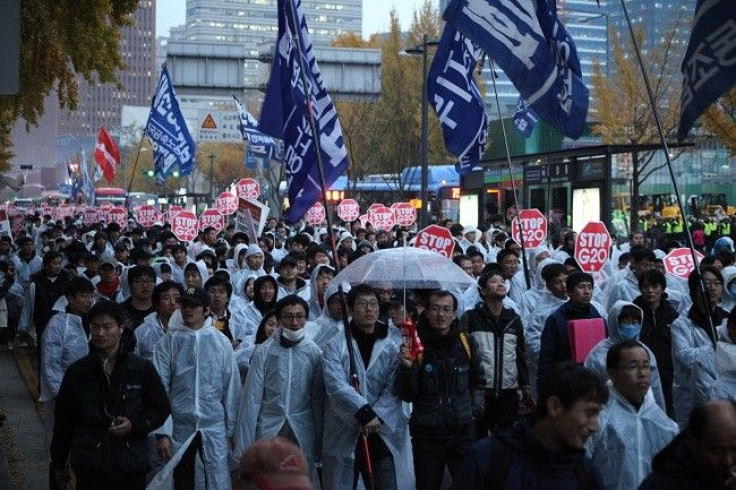Protestors march against G-20 and Korean government

Carrying flags representing their various organizations, and hundreds of cardboard stop signs declaring Stop the G-20!, approximately 4,000 protestors marched Thursday afternoon from Seoul Station through the Dongsam-gu district shouting slogans and singing labor hymns, while thunder rolled, rain fell and a silent column of hundreds of riot police in yellow slickers and wielding neon batons kept pace along the marchers' flank.
The demonstrators were several miles from the COEX Center and other venues where the G-20 Summit was taking place, prohibited by authorities from approaching those areas, where thousands of other police patrolled in platoons.
Earlier in the day, before the rally outside the landmark train station had begun, and in front of the heavily guarded COEX Center, a middle-aged woman doused herself in paint thinner and attempted to set herself on fire. Police prevented her from doing so.
Police said they did not know the woman's motive. She did not appear to have any connection with the protestors across town. The rally and march took place without violent incidents.
The protest was organized by the Korean Confederation of Trade Unions, an organization of over 600,000 members.
The G-20 does not have the ability or the political will to solve the economic crisis, said KCTU President Kim Young-hoon, in a release prior to the rally.
While completely excluding most nations from decision-making, the G20 is attempting to make the world 'safe' for neoliberal capitalism by forcing emerging economies to shoulder part of the burden of the crisis, promoting trade and investment liberalization dressed up 'in new robes', negotiating weak financial reforms that largely allow financial speculation to go on unchecked, and reviving the ailing IMF, he said.
Kim said the current global system promoted by the G-20 only increases poverty and inequality around the globe.
Many of the marchers had grievances specific to South Korea.
I'm a teacher and a member of the Korean Teachers Union, said Kim Jin Hun. The government is treating Korean teachers unfairly. Teachers have been fired and suspended for political reasons.
The government of President Lee Myung-bak has had run-ins with the teachers union in the past two years, as it has tried to implement reforms in ranking schools by performance and instituting a program of more standardized tests. When 17,000 teachers signed a petition against government interference last year, the Lee government threatened disciplinary action against the signatories.
I am marching to protest the Four Rivers Project, said Park Eunseon. The government puts on a good face for the world, and speaks highly of the project. But the project is ruining the environment.
The Four Rivers Restoration Project is an $18 billion plan to further develop Korea's four major river systems - the Han, Nakdong, Geum, and Youngsan - with the stated objectives of preventing water shortages, improving water quality and flood control, and creating parks for tourism.
Critics say the project, which involves building 16 new dams on those rivers and rebuilding 87 old dams, will ruin the habitat of multitudes of migratory birds and further spoil the natural environment. They point out that, while nations throughout the world are removing dams and taking down concrete barriers in their environmental restoration projects, South Korea is going in the opposite direction.
Organizations from outside Korea also participated in the demonstration.
The Global Call for Action Against Poverty, or GCAP, issued a release noting that most of the nations of the world are not represented at the G-20.
More than two billion people - largely women, children and the socially excluded - live in impoverished communities subsisting on less than 2 US dollars per day. The G-20 makes decisions that impact the lives of people living in poverty without adequately involving them in the process, the GCAP statement said.
The South Korean government has deployed 50,000 police throughout Seoul to maintain order and peace throughout the conference.
© Copyright IBTimes 2024. All rights reserved.











